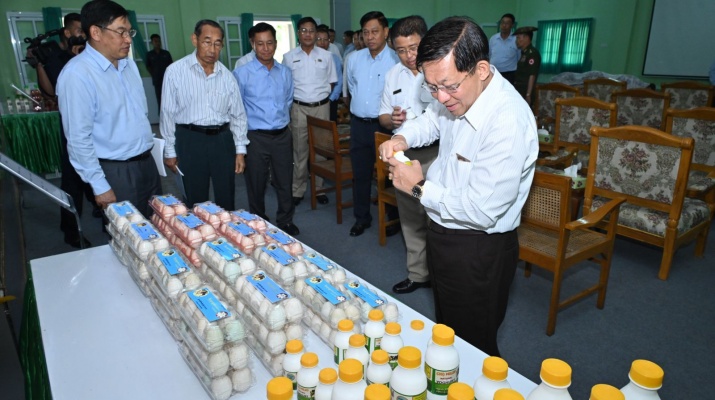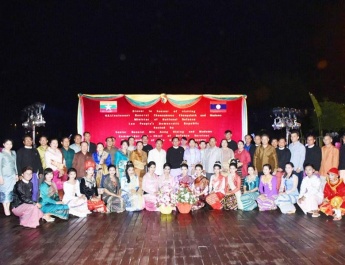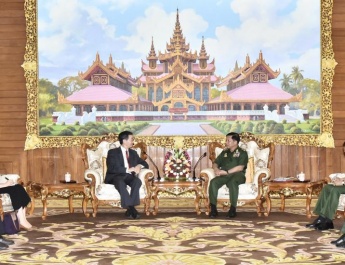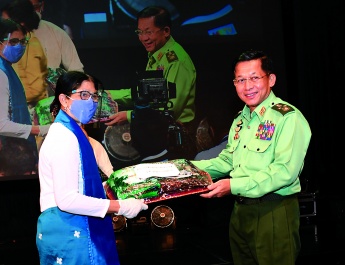Nay Pyi Taw June 8
Chairman of the State Administration Council Prime Minister Senior General Min Aung Hlaing, along with his entourage, the Chief Minister of Yangon Region, the Yangon Command Commander, Mayor U Bo Htay, and other officials, visited the Thilawa Integrated Agriculture and Livestock Breeding Zone of Myanmar Economic Corporation located between the Yangon River and Hmawwun Creek in Kyauktan Township, Yangon Region, this afternoon.

Firstly, at the briefing hall of the zone, Chairman of the Myanmar Economic Corporation Lt-General Nyo Saw and officials briefed the Senior General on the implementation status of the Shwe Pyi Agriculture and Livestock Breeding Zone, the Thilawa Integrated Agriculture and Livestock Breeding Zone, and the 26-Mile Agriculture and Livestock Breeding Zone. They also reported on the progress of the implementation of the directives by the Prime Minister, the establishment and operations of various integrated agriculture and livestock breeding zones, livestock production such as fish, ducks, chickens, dairy cattle, beef cattle, and pigs, using quality breeds, modern machinery, and efficient feeding systems, and the current market distribution of agricultural products. Additionally, they discussed the manufacturing of animal feed and machines for producing animal feed blocks, dairy production and sales, and the implementation of rubber plantation projects.

Regarding the briefings, the Senior General stated that the establishment of such agriculture and livestock breeding zones within Yangon Region aims to ensure the sufficiency of meat, fish, and seasonal crops, balancing demand and supply due to the region’s large population and numerous factories, and controlling the prices of essential goods. He emphasized the importance of efficient land use within the agriculture and livestock zones, the opening of the third Thanlyin Bridge across the Bago River, which would further develop the Thanlyin area, and the need for systematic implementation to increase productivity. The Prime Minister also highlighted the importance of planning the production of poultry and ducks in a coordinated manner to ensure continuous production and improving livestock techniques to boost output.
He stated that the primary goal is not profit but to enable the people of Yangon Region to purchase meat, fish, and seasonal crops at affordable prices, urging for more successful implementation. The Prime Minister stressed the need for proper feeding and hydration in livestock production to enhance output.
He also mentioned that directly distributing products from the agriculture zones to the market would ensure reasonable prices. He urged cooperation with the Yangon City Development Committee and the Regional Military Command’s affordable shops for direct distribution.

He also mentioned the pote[1]ntial for expanding product[1]ion for local consumption and exporting quality products like frozen meat and fish to neighbor[1]ing and regional countries, where there is a high demand for such products. Therefore, efforts must be made to meet the needs of domestic consumers and work towards exporting high[1]quality agricultural products abroad. In conducting agricultural activities, it is necessary to use modern techniques rather than relying on traditional methods. The country should continuously study and emulate the agricultural and farming methods of other countries that are successful in the agriculture sector. Afterward, the Prime Minister and his entourage inspected various fish species and products such as eggs, duck eggs, and dairy products displayed at the Thilawa Integrated Agriculture and Livestock Breeding Zone. They also inspected the hatching and breeding of fingerlings within the zone and left necessary instructions based on the briefings from responsible officials.
Finally, the Prime Minister toured the Thilawa Integrated Agriculture and Livestock Breeding Zone, inspecting duck and fish farming operations and providing directives to ensure systematic implementation of livestock production.





